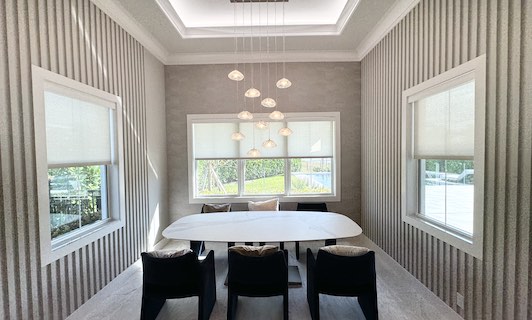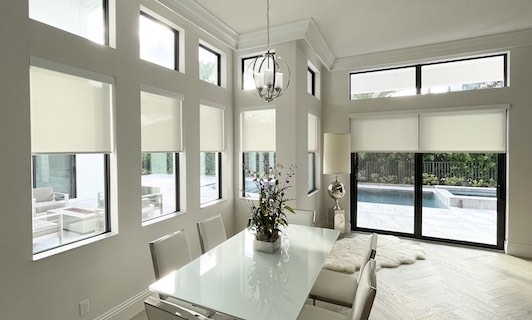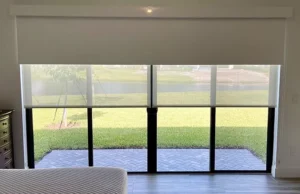
Choosing the right window treatments can significantly enhance the comfort, functionality, and style of your living space. When it comes to window shades, two popular options stand out: blackout shades and solar shades. Both have unique features that cater to different needs, but deciding which one is best for your space requires a closer look at their benefits and drawbacks.
In this article, we’ll dive deep into both blackout and solar shades, exploring their uses, advantages, and potential downsides. By the end, you’ll have a clear understanding of which option best suits your home or office.
What Are Blackout Shades?

Blackout shades are designed to block out nearly all external light. They’re often made of thick, opaque materials that provide complete darkness in a room when fully closed.
Benefits of Blackout Shades:
- Complete Darkness — blackout shades can block up to 99% of sunlight, making them ideal for bedrooms or any space where total darkness is desired, such as media rooms or nurseries.
- Privacy — these shades offer maximum privacy since no one can see through them, even at night with the lights on inside.
- Energy Efficiency — the thick, insulating materials used in blackout shades can help regulate indoor temperatures, reducing heat in the summer and retaining warmth in the winter. This energy-saving feature can lead to lower utility bills.
- Noise Reduction— because blackout shades are often made with dense fabrics, they can help reduce outdoor noise, creating a quieter indoor environment. This is particularly useful in busy urban areas.
- Sleep Improvement— for light-sensitive sleepers, blackout shades are a game-changer. They allow you to create a pitch-black room, which can improve sleep quality by blocking out sunlight and streetlights.
- Protection for Interiors— by blocking out harmful UV rays, blackout shades protect your furniture, flooring, and artwork from fading or damage due to prolonged sun exposure.
Drawbacks of Blackout Shades:
- Lack of Natural Light— when closed, blackout shades completely eliminate natural light. This can make a room feel too dark, especially during the day, and necessitate artificial lighting.
- Heavier Appearance — blackout shades are often bulkier and more solid in appearance, which may not suit all interior design styles, particularly those favoring a light and airy look.
- Limited View Outside—when the shades are down, you won’t be able to enjoy any outdoor view. This can make a space feel more enclosed.
- Not Ideal for All Rooms— while blackout shades are perfect for bedrooms and media rooms, they might not be the best choice for living spaces, kitchens, or offices where some level of natural light is desirable.
What Are Solar Shades?

Solar shades, on the other hand, are designed to filter sunlight without completely blocking it. Made from a mesh-like fabric, solar shades reduce glare and heat while still allowing some natural light to pass through.
Benefits of Solar Shades:
- Light Control—solar shades filter sunlight, allowing you to maintain a bright, sunlit room without the harsh glare. They provide the best of both worlds: natural light and UV protection.
- Preserve Outdoor Views—one of the standout features of solar shades is their ability to allow outward visibility. You can still enjoy your view of the garden or city skyline while minimizing heat and glare.
- UV Protection—solar shades block up to 99% of harmful UV rays, which helps protect your furniture, floors, and artwork from fading due to sun exposure.
- Heat Reduction—solar shades reduce solar heat gain, keeping your space cooler on sunny days. This can help lower cooling costs, especially during the summer months.
- Privacy During the Day—during daylight hours, solar shades offer some degree of privacy. While you can see out, people on the outside can’t easily see in.
- Sleek, Modern Look—solar shades tend to have a sleek, minimalist appearance that works well with contemporary or modern interior designs. They offer a clean, subtle window treatment option.
- Durability—solar shades are often made from durable, moisture-resistant materials, making them a good choice for kitchens, bathrooms, and sunrooms.
Drawbacks of Solar Shades:
- Limited Privacy at Night—while solar shades offer privacy during the day, they lose this benefit at night. When it’s dark outside and your lights are on inside, people can see in clearly. There are still solar shades that offer privacy at night but it’s limited, for example only shades with 1% openness will give privacy.
- Reduced Light Blocking—solar shades filter light rather than block it entirely. If you’re looking for total darkness, such as in a bedroom or media room, solar shades won’t meet your needs.
- Less Effective for Noise Reduction—unlike blackout shades, solar shades don’t provide any noise insulation. If noise reduction is a priority, solar shades may not be the best choice.
Comparison: Blackout Shades vs. Solar Shades
Now that we’ve explored the individual features of blackout and solar shades, let’s break down their key differences to help you choose the right one for your space.
| Feature | Blackout Shades | Solar Shades |
| Light Control | Blocks nearly all light | Filters sunlight, reduces glare |
| Privacy | Full privacy, day and night | Privacy during day, limited to none at night |
| Energy Efficiency | Excellent insulation, reduces heat loss | Reduces solar heat gain, keeps space cooler |
| View Outside | No outdoor visibility when closed | Allows outward visibility |
| UV Protection | Blocks 99% of UV rays | Blocks 90-99% of UV rays |
| Noise Reduction | Provides some noise insulation | No noise reduction |
| Aesthetic | Bulkier, may look heavy | Sleek, modern appearance |
| Best for | Bedrooms, media rooms, nurseries | Living rooms, offices, kitchens, sunrooms |
Choosing the Right Shade for Your Space
To make an informed decision, consider the specific needs of each room and how you want to balance light control, privacy, and style. Here’s a breakdown of which option might work best in various spaces:
Bedrooms:
- Recommended: Blackout Shades — For a good night’s sleep, blackout shades are ideal. They create a dark, private environment perfect for uninterrupted rest. This is particularly important for light-sensitive sleepers or for rooms where people sleep during the day, like nurseries.
Living Rooms:
- Recommended: Solar Shades — In living rooms, you’ll likely want a bright and inviting atmosphere without glare. Solar shades offer light control and UV protection while maintaining a connection to the outdoors. If privacy is a concern, consider pairing solar shades with curtains or drapes for nighttime.
Home Offices:
- Recommended: Solar Shades— Solar shades are perfect for home offices because they reduce glare on computer screens while allowing natural light to brighten the space. This can boost productivity and create a comfortable work environment.
Media Rooms/Home Theaters:
- Recommended: Blackout Shades— If you have a room dedicated to watching movies or playing video games, blackout shades are essential. They ensure there’s no unwanted light interfering with your viewing experience.
Kitchens and Bathrooms:
- Recommended: Solar Shades— Kitchens and bathrooms benefit from solar shades because they offer light control without making the space feel too dark or closed in. Their moisture-resistant materials also make them a practical choice for humid environments.
Nurseries/Children’s Rooms:
- Recommended: Blackout Shades— Young children often need a dark, quiet room to nap during the day, making blackout shades a great choice. They also provide added noise reduction, helping to create a calm, peaceful environment.
Sunrooms:
- Recommended: Solar Shades— In sunrooms, you want to enjoy the natural light without the excessive heat. Solar shades allow you to do just that, maintaining the room’s brightness while reducing glare and UV exposure.
Combining Blackout and Solar Shades

In some cases, you might want the benefits of both blackout and solar shades. For instance, you can install dual roller shades, which allow you to switch between blackout and solar shade materials depending on the time of day or your needs. This offers maximum flexibility in light control and privacy.
Conclusion
When it comes to choosing between blackout shades and solar shades, there’s no one-size-fits-all solution. The right choice depends on your specific needs for each room in your home. If you prioritize complete darkness, privacy, and insulation, blackout shades are the way to go. However, if you want to maintain natural light, reduce glare, and preserve your view, solar shades are the better option.
By carefully considering the pros and cons of each type, you can select the perfect window treatment to enhance the comfort, style, and functionality of your space. Whether you opt for blackout shades, solar shades, or a combination of both, the right decision will transform your home into a more comfortable and inviting environment.


